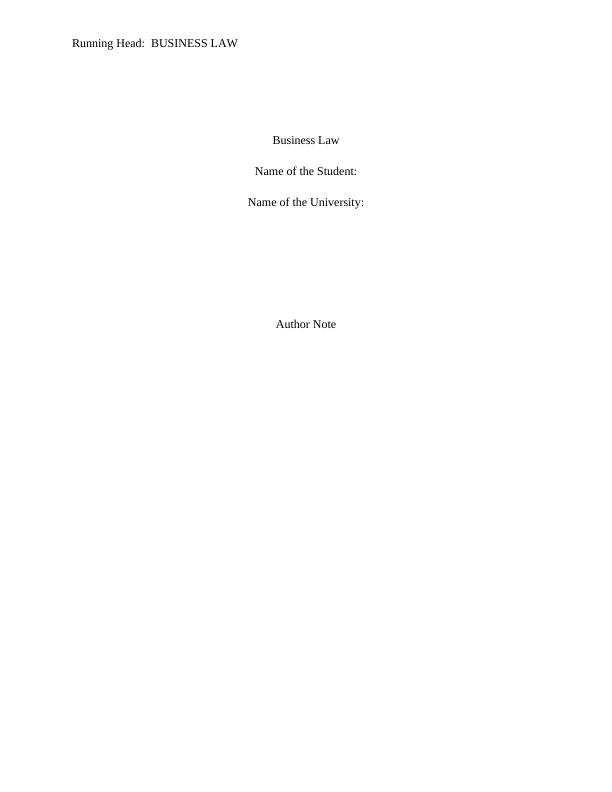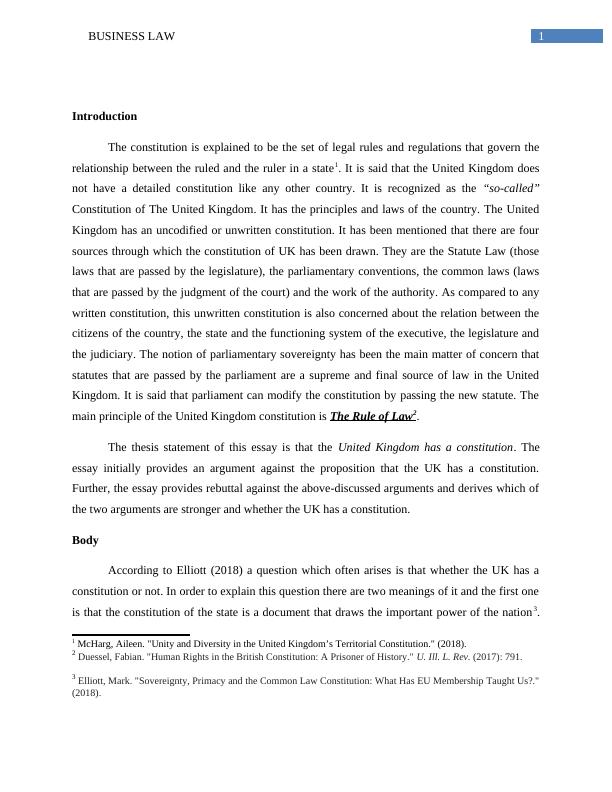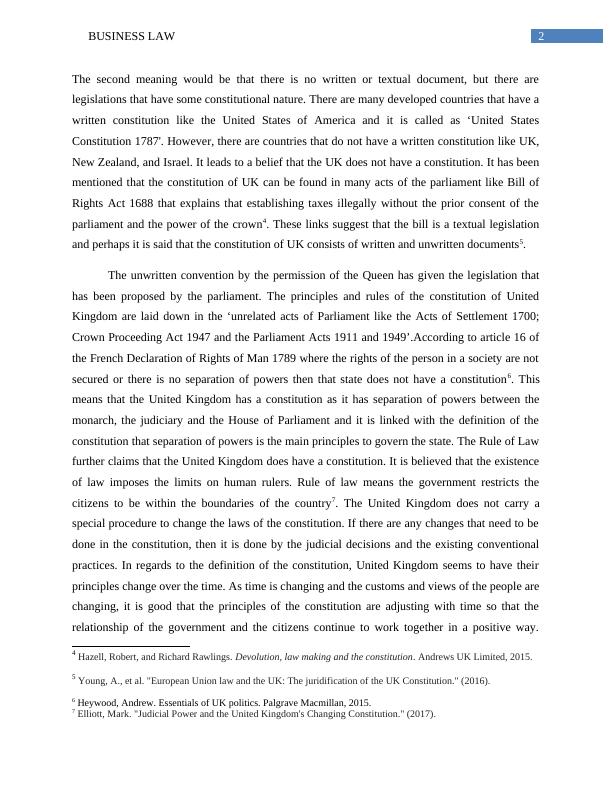The Constitution of the United Kingdom: Written or Unwritten?
Added on 2023-06-13
9 Pages3079 Words146 Views
Running Head: BUSINESS LAW
Business Law
Name of the Student:
Name of the University:
Author Note
Business Law
Name of the Student:
Name of the University:
Author Note

1BUSINESS LAW
Introduction
The constitution is explained to be the set of legal rules and regulations that govern the
relationship between the ruled and the ruler in a state1. It is said that the United Kingdom does
not have a detailed constitution like any other country. It is recognized as the “so-called”
Constitution of The United Kingdom. It has the principles and laws of the country. The United
Kingdom has an uncodified or unwritten constitution. It has been mentioned that there are four
sources through which the constitution of UK has been drawn. They are the Statute Law (those
laws that are passed by the legislature), the parliamentary conventions, the common laws (laws
that are passed by the judgment of the court) and the work of the authority. As compared to any
written constitution, this unwritten constitution is also concerned about the relation between the
citizens of the country, the state and the functioning system of the executive, the legislature and
the judiciary. The notion of parliamentary sovereignty has been the main matter of concern that
statutes that are passed by the parliament are a supreme and final source of law in the United
Kingdom. It is said that parliament can modify the constitution by passing the new statute. The
main principle of the United Kingdom constitution is The Rule of Law2.
The thesis statement of this essay is that the United Kingdom has a constitution. The
essay initially provides an argument against the proposition that the UK has a constitution.
Further, the essay provides rebuttal against the above-discussed arguments and derives which of
the two arguments are stronger and whether the UK has a constitution.
Body
According to Elliott (2018) a question which often arises is that whether the UK has a
constitution or not. In order to explain this question there are two meanings of it and the first one
is that the constitution of the state is a document that draws the important power of the nation 3.
1 McHarg, Aileen. "Unity and Diversity in the United Kingdom’s Territorial Constitution." (2018).
2 Duessel, Fabian. "Human Rights in the British Constitution: A Prisoner of History." U. Ill. L. Rev. (2017): 791.
3 Elliott, Mark. "Sovereignty, Primacy and the Common Law Constitution: What Has EU Membership Taught Us?."
(2018).
Introduction
The constitution is explained to be the set of legal rules and regulations that govern the
relationship between the ruled and the ruler in a state1. It is said that the United Kingdom does
not have a detailed constitution like any other country. It is recognized as the “so-called”
Constitution of The United Kingdom. It has the principles and laws of the country. The United
Kingdom has an uncodified or unwritten constitution. It has been mentioned that there are four
sources through which the constitution of UK has been drawn. They are the Statute Law (those
laws that are passed by the legislature), the parliamentary conventions, the common laws (laws
that are passed by the judgment of the court) and the work of the authority. As compared to any
written constitution, this unwritten constitution is also concerned about the relation between the
citizens of the country, the state and the functioning system of the executive, the legislature and
the judiciary. The notion of parliamentary sovereignty has been the main matter of concern that
statutes that are passed by the parliament are a supreme and final source of law in the United
Kingdom. It is said that parliament can modify the constitution by passing the new statute. The
main principle of the United Kingdom constitution is The Rule of Law2.
The thesis statement of this essay is that the United Kingdom has a constitution. The
essay initially provides an argument against the proposition that the UK has a constitution.
Further, the essay provides rebuttal against the above-discussed arguments and derives which of
the two arguments are stronger and whether the UK has a constitution.
Body
According to Elliott (2018) a question which often arises is that whether the UK has a
constitution or not. In order to explain this question there are two meanings of it and the first one
is that the constitution of the state is a document that draws the important power of the nation 3.
1 McHarg, Aileen. "Unity and Diversity in the United Kingdom’s Territorial Constitution." (2018).
2 Duessel, Fabian. "Human Rights in the British Constitution: A Prisoner of History." U. Ill. L. Rev. (2017): 791.
3 Elliott, Mark. "Sovereignty, Primacy and the Common Law Constitution: What Has EU Membership Taught Us?."
(2018).

2BUSINESS LAW
The second meaning would be that there is no written or textual document, but there are
legislations that have some constitutional nature. There are many developed countries that have a
written constitution like the United States of America and it is called as ‘United States
Constitution 1787'. However, there are countries that do not have a written constitution like UK,
New Zealand, and Israel. It leads to a belief that the UK does not have a constitution. It has been
mentioned that the constitution of UK can be found in many acts of the parliament like Bill of
Rights Act 1688 that explains that establishing taxes illegally without the prior consent of the
parliament and the power of the crown4. These links suggest that the bill is a textual legislation
and perhaps it is said that the constitution of UK consists of written and unwritten documents5.
The unwritten convention by the permission of the Queen has given the legislation that
has been proposed by the parliament. The principles and rules of the constitution of United
Kingdom are laid down in the ‘unrelated acts of Parliament like the Acts of Settlement 1700;
Crown Proceeding Act 1947 and the Parliament Acts 1911 and 1949’.According to article 16 of
the French Declaration of Rights of Man 1789 where the rights of the person in a society are not
secured or there is no separation of powers then that state does not have a constitution6. This
means that the United Kingdom has a constitution as it has separation of powers between the
monarch, the judiciary and the House of Parliament and it is linked with the definition of the
constitution that separation of powers is the main principles to govern the state. The Rule of Law
further claims that the United Kingdom does have a constitution. It is believed that the existence
of law imposes the limits on human rulers. Rule of law means the government restricts the
citizens to be within the boundaries of the country7. The United Kingdom does not carry a
special procedure to change the laws of the constitution. If there are any changes that need to be
done in the constitution, then it is done by the judicial decisions and the existing conventional
practices. In regards to the definition of the constitution, United Kingdom seems to have their
principles change over the time. As time is changing and the customs and views of the people are
changing, it is good that the principles of the constitution are adjusting with time so that the
relationship of the government and the citizens continue to work together in a positive way.
4 Hazell, Robert, and Richard Rawlings. Devolution, law making and the constitution. Andrews UK Limited, 2015.
5 Young, A., et al. "European Union law and the UK: The juridification of the UK Constitution." (2016).
6 Heywood, Andrew. Essentials of UK politics. Palgrave Macmillan, 2015.
7 Elliott, Mark. "Judicial Power and the United Kingdom's Changing Constitution." (2017).
The second meaning would be that there is no written or textual document, but there are
legislations that have some constitutional nature. There are many developed countries that have a
written constitution like the United States of America and it is called as ‘United States
Constitution 1787'. However, there are countries that do not have a written constitution like UK,
New Zealand, and Israel. It leads to a belief that the UK does not have a constitution. It has been
mentioned that the constitution of UK can be found in many acts of the parliament like Bill of
Rights Act 1688 that explains that establishing taxes illegally without the prior consent of the
parliament and the power of the crown4. These links suggest that the bill is a textual legislation
and perhaps it is said that the constitution of UK consists of written and unwritten documents5.
The unwritten convention by the permission of the Queen has given the legislation that
has been proposed by the parliament. The principles and rules of the constitution of United
Kingdom are laid down in the ‘unrelated acts of Parliament like the Acts of Settlement 1700;
Crown Proceeding Act 1947 and the Parliament Acts 1911 and 1949’.According to article 16 of
the French Declaration of Rights of Man 1789 where the rights of the person in a society are not
secured or there is no separation of powers then that state does not have a constitution6. This
means that the United Kingdom has a constitution as it has separation of powers between the
monarch, the judiciary and the House of Parliament and it is linked with the definition of the
constitution that separation of powers is the main principles to govern the state. The Rule of Law
further claims that the United Kingdom does have a constitution. It is believed that the existence
of law imposes the limits on human rulers. Rule of law means the government restricts the
citizens to be within the boundaries of the country7. The United Kingdom does not carry a
special procedure to change the laws of the constitution. If there are any changes that need to be
done in the constitution, then it is done by the judicial decisions and the existing conventional
practices. In regards to the definition of the constitution, United Kingdom seems to have their
principles change over the time. As time is changing and the customs and views of the people are
changing, it is good that the principles of the constitution are adjusting with time so that the
relationship of the government and the citizens continue to work together in a positive way.
4 Hazell, Robert, and Richard Rawlings. Devolution, law making and the constitution. Andrews UK Limited, 2015.
5 Young, A., et al. "European Union law and the UK: The juridification of the UK Constitution." (2016).
6 Heywood, Andrew. Essentials of UK politics. Palgrave Macmillan, 2015.
7 Elliott, Mark. "Judicial Power and the United Kingdom's Changing Constitution." (2017).

End of preview
Want to access all the pages? Upload your documents or become a member.
Related Documents
Parliamentary Sovereignty and the Impact of Brexit on the UK Economylg...
|7
|1839
|188
Parliamentary Sovereignty and the Impact of Brexit on the UK's Constitutionlg...
|7
|2004
|266
Introduction to Law: Separation of Powers, Parliamentary Supremacy, and Rule of Lawlg...
|8
|1720
|1
The Effect of UK's Membership on the Sovereignty of Parliamentlg...
|13
|3901
|158
Parliamentary Sovereignty and Sources of Laws in UKlg...
|20
|4449
|439
Parliamentary Sovereignty in the United Kingdomlg...
|14
|4491
|133
